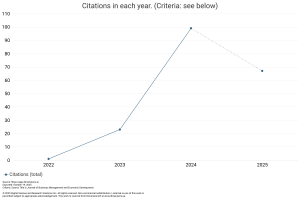Influence of Influencer Marketing, Fear of Missing Out (FOMO), and Trust on Crypto Asset Purchase Decisions among Generation Z in Discord Miracle Class
DOI:
https://doi.org/10.59653/jbmed.v3i03.1932Keywords:
Purchase Decision, Influencer Marketin, FOMO, Trust, Cryptocurrency, Generation ZAbstract
This study aimed to determine the effect of Influencer Marketing, Fear of Missing Out (FOMO), and Trust on crypto asset purchase decisions among Generation Z participants in the Discord Miracle Class community. The research employed quantitative methodology and applied Partial Least Squares (PLS) analysis using SmartPLS software version 4.1.0.9. Data were collected from 94 respondents who are active members of the Discord Miracle Class community through online questionnaires. The results demonstrated that Influencer Marketing had a positive and significant effect on crypto asset purchase decisions among Generation Z (path coefficient = 0.421, p < 0.05). FOMO also exhibited a positive and significant effect on crypto asset purchase decisions (path coefficient = 0.312, p < 0.05). Similarly, Trust showed a positive and significant influence on crypto asset purchase decisions in the same demographic (path coefficient = 0.389, p < 0.05). The combined effect of these three variables explained 72% of the variance in purchase decisions (R² = 0.720). This study contributes to the development of literature in digital consumer behavior and financial technology adoption, particularly in the context of crypto asset investment among Generation Z. The findings provide valuable insights for marketers, financial institutions, and policymakers in understanding the psychological and social factors that drive cryptocurrency investment decisions among young digital natives.
Downloads
References
Ajzen, I. (1991). The theory of planned behavior. Organizational Behavior and Human Decision Processes, 50(2), 179-211.
Brown, D., & Hayes, N. (2008). Influencer marketing: Who really influences your customers?. Butterworth-Heinemann.
Cahya Nagari, J., Nugroho, R. S., Dzaky, N. E., Effendy, F. W., Pujiastuti, D., & Wanih, S. T. I. (2024). Transforming consumer behavior in the digital era: Challenges and opportunities for the media industry. International Journal of Progressive Sciences and Technologies (IJPSAT), 45(2), 618-622.
Chen, L., & Wang, R. (2023). Social media influence on cryptocurrency investment behavior: Evidence from emerging markets. Journal of Digital Finance, 8(3), 45-62.
Cohen, J. (1988). Statistical power analysis for the behavioral sciences (2nd ed.). Lawrence Erlbaum Associates.
De Veirman, M., Cauberghe, V., & Hudders, L. (2017). Marketing through Instagram influencers: The impact of number of followers and product divergence on brand attitude. International Journal of Advertising, 36(5), 798-828.
Ghozali, I. (2016). Aplikasi analisis multivariate dengan program IBM SPSS 23. Badan Penerbit Universitas Diponegoro.
Hair, J. F., Risher, J. J., Sarstedt, M., & Ringle, C. M. (2019). When to use and how to report the results of PLS-SEM. European Business Review, 31(2), 2-24.
Harris Poll. (2023). Generation Z and cryptocurrency investment trends. Harris Insights & Analytics.
Hayran, C., & Anik, L. (2021). Well-being and fear of missing out (FOMO) on digital content in the time of COVID-19: A correlational analysis. Cyberpsychology, Behavior, and Social Networking, 24(2), 128-135.
Indonesian Internet Service Providers Association (APJII). (2024). Indonesian internet user statistics 2024. APJII Research Center.
Johnson, M., & Thompson, K. (2023). Trust mechanisms in decentralized finance: A Generation Z perspective. Blockchain and Society Journal, 12(4), 78-95.
Kim, D. J., Ferrin, D. L., & Rao, H. R. (2021). Trust and satisfaction, two stepping stones for successful e-commerce relationships: A longitudinal exploration. Information Systems Research, 20(2), 237-257.
Kotler, P., & Armstrong, G. (2021). Principles of marketing (18th ed.). Pearson.
Lee, S., & Park, H. (2024). Digital native investment patterns: How Generation Z approaches cryptocurrency markets. Financial Technology Review, 15(2), 112-128.
Liu, Y., Zhang, W., & Chen, M. (2023). The psychology of cryptocurrency investment: FOMO, social influence, and decision-making among young adults. Behavioral Finance Quarterly, 9(3), 34-48.
Mara, S. V. (2023). The influence of gambler's fallacy, FOMO, hindsight on millennial generation decisions in cryptocurrency investment. Indonesian Journal of Business and Economics, 6(2), 167-181.
McKnight, D. H., Choudhury, V., & Kacmar, C. (2002). Developing and validating trust measures for e-commerce: An integrative typology. Information Systems Research, 13(3), 334-359.
Miller, R., & Davis, J. (2024). Educational communities and financial decision-making: The role of Discord in cryptocurrency learning. Digital Education Research, 7(1), 23-39.
Nguyen, T., & Rodriguez, A. (2023). Cross-cultural analysis of cryptocurrency adoption: Trust, technology, and generational differences. International Business Review, 45(6), 234-251.
Przybylski, A. K., Murayama, K., DeHaan, C. R., & Gladwell, V. (2013). Motivational, emotional, and behavioral correlates of fear of missing out. Computers in Human Behavior, 29(4), 1841-1848.
Smith, A., & Wilson, B. (2024). Platform effects on investment behavior: Comparing social media influences across generations. Social Media and Finance Journal, 11(2), 89-106.
Sugiyono. (2013). Metode penelitian kuantitatif, kualitatif, dan R&D. Alfabeta.
Taylor, C., & Brown, E. (2023). Regulatory frameworks for social media financial advice: Protecting young investors in the digital age. Financial Regulation Quarterly, 28(4), 156-174.
Wijaya, D. I. (2024). The influence of influencer marketing, FOMO, and trust on cryptocurrency purchase decisions. Unpublished master's thesis, University of Indonesia.
Willyan, & Ratnawaty. (2024). Trust factors in cryptocurrency adoption: A systematic literature review. Digital Finance and Technology, 13(1), 45-67.
Yusita, N. W., Fauzi, R. U. A., & Sidanti, H. (2024). The influence of e-WOM and price perception on purchase decisions with trust as a mediating variable. Journal of Business and Management, 8(3), 112-128.
Zanesty, A. R., Tio, A. D. P., Chantika, A. I., & Nur, A. R. (2022). Analysis of the influence of social media influencers on Indonesian people's decisions in purchasing cryptocurrency. BISTEK Journal, 4(2), 89-104. doi:10.55208/bistek.
Zuchroh, I. (2021). Fintech Syariah: Kolaborasi Teknologi dan Moral sebagai Instrumen Pembiayaan di Masa Depan. Ecoplan, 4(2), 122–130. https://doi.org/10.20527/ecoplan.v4i2.383
Zuchroh, I. (2022). Zakat Produktif: Kebijakan Pengelolaan Keuangan Publik sebagai Instrumen Pengentasan Kemiskinan di Indonesia. Jurnal Ilmiah Ekonomi Islam, 8(03), 3067–3073. http://dx.doi.org/10.29040/jiei.v8i3.6387
Downloads
Published
How to Cite
Issue
Section
License
Copyright (c) 2025 Ezra Tri Kurniawan, Imama Zuchroh

This work is licensed under a Creative Commons Attribution-ShareAlike 4.0 International License.
Authors who publish with this journal agree to the following terms:
- Authors retain copyright and grant the journal right of first publication with the work simultaneously licensed under a Creative Commons Attribution-ShareAlike that allows others to share the work with an acknowledgement of the work's authorship and initial publication in this journal.
- Authors are able to enter into separate, additional contractual arrangements for the non-exclusive distribution of the journal's published version of the work (e.g., post it to an institutional repository or publish it in a book), with an acknowledgement of its initial publication in this journal.
- Authors are permitted and encouraged to post their work online (e.g., in institutional repositories or on their website) prior to and during the submission process, as it can lead to productive exchanges, as well as earlier and greater citation of published work (See The Effect of Open Access).





























